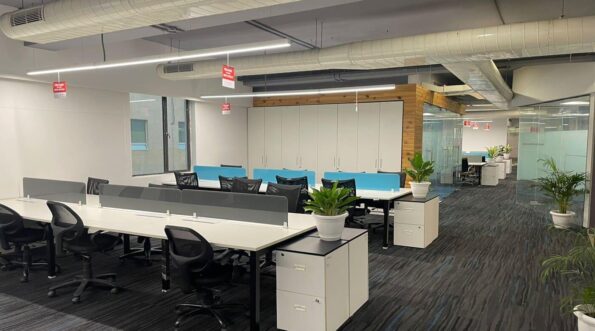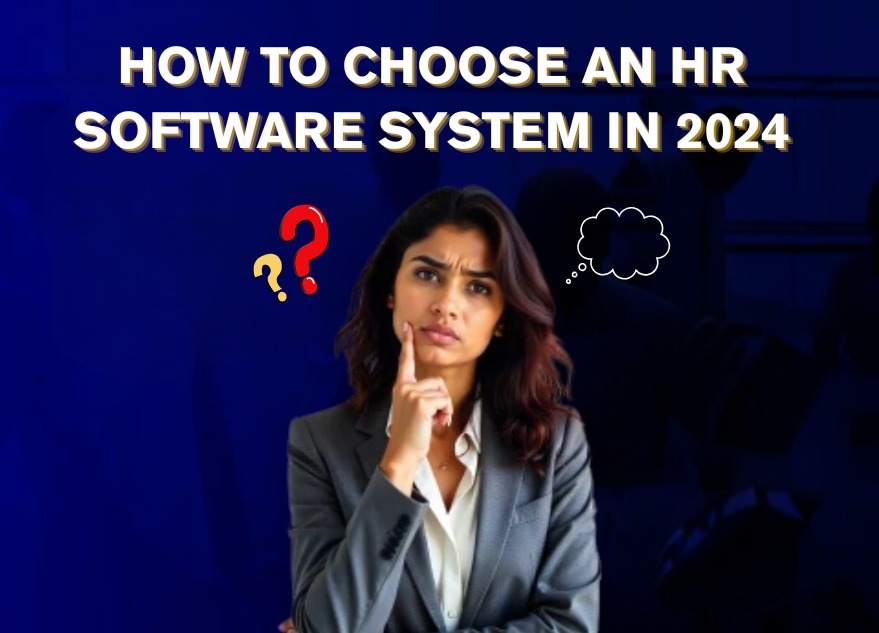In the fast-paced business landscape of current times, companies are increasingly recognizing the need for an efficient and effective Human Resource (HR) Software System to streamline HR processes. Such a system has become an indispensable tool for businesses of all sizes to automate tasks like employee data management, payroll processing, benefits administration, and performance reviews. However, choosing the right HR software can be a daunting task in 2024 and requires careful consideration of various factors to ensure that it aligns with the needs of your organization, its goals, and budget. Here’s a complete guide to help you navigate the selection process effectively:
💡 Are you looking for Coworking space in Gurgaon, Noida or Delhi? We are just a call away.
Call Now: 08999 828282
12 Top tips to Choose an HR Software System in 2024
- Assess Your Needs
- Define Key Features
- Consider Scalability
- Evaluate Integration Capabilities
- Check Compliance and Security
- Assess User Experience
- Review Vendor Reputation and Support
- Consider Cloud-Based vs. On-Premises Solutions
- Factor in Cost and ROI
- Seek Input from Stakeholders
- Plan for Implementation and Training
- Stay Agile and Adapt

1. Assess Your Needs
To Start with, identify the specific HR needs and priorities of your organization. Consider factors like the size of your workforce, industry regulations, existing HR processes, and areas where automation or improvement is needed.
2. Define Key Features
The next big task is to create a list of must-have features and functionalities for your HR software system. This includes core HR functions such as:
- Payroll processing
- Employee data management
- Time and attendance tracking
- Performance management
- Benefits administration, and
- Recruitment management
3. Consider Scalability
Next, you must choose an HR software system that can scale with your organization with its growth. Also, look for a solution that offers flexibility and customization options to accommodate changes in workforce size, structure, and requirements over time.
4. Evaluate Integration Capabilities
It is also important to assess the compatibility and integration capabilities of the HR software system with your organization’s existing systems and software applications. These include checking the compatibility of payroll, accounting, CRM, and communication tools. Seamless integration is important to ensure smooth data flow and to eliminate duplicate data entry.
5. Check Compliance and Security
Make sure that the HR software system complies well with the relevant data protection regulations like GDPR or CCPA. The system should also meet other industry-specific compliance requirements. Further, prioritizing security features such as data encryption, role-based access controls, and regular security updates is also important to safeguard sensitive employee information.
Also Read: Why Startup Companies Need Structured HR?
6. Assess User Experience
You must choose an HR software system that is user-friendly and intuitive for both HR administrators and employees. It is also important to conduct demos or trials to evaluate the interface, navigation, and overall user experience of the software and to ensure ease of use and adoption.
7. Review Vendor Reputation and Support
To know the reputation of the HR software system, it is important to research and track the software vendor well. For this, you may rely on customer reviews, testimonials, and case studies to understand customer satisfaction and reliability. Further, evaluate the level of customer support, training resources, and ongoing maintenance provided by the vendor.
8. Consider Cloud-Based vs. On-Premises Solutions
It is also important to decide whether a cloud-based or on-premises HR software solution will suit the needs of your organization best. For greater flexibility, you may opt for cloud-based solutions that offer accessibility, and scalability, while on-premises solutions provide more control over data security and customization.
💡 SMBs looking for HR, Marketing, Technology and Funding solutions for their business.
Call Hello Jarvis 994 8000 800
9. Factor in Cost and ROI
Determining a budget is another pivotal point while considering HR software implementation and ongoing maintenance costs. Consider the total cost of ownership, including licensing fees, implementation costs, training expenses, and potential upgrades. Also, don’t miss on evaluating the ROI or return on investment potential of the HR software system in terms of improved efficiency, productivity gains, and cost savings.
10. Seek Input from Stakeholders
Involve HR professionals, department heads, IT staff, end-users, and other key stakeholders in the decision-making process. Gather feedback, address concerns, and ensure buy-in from all stakeholders to facilitate successful implementation and adoption of the chosen HR software system.
11. Plan for Implementation and Training
Create a comprehensive implementation plan that outlines timelines, milestones, and responsibilities for deploying the HR software system. Allocate sufficient resources for training and onboarding to ensure that users are adequately prepared to use the software effectively.
12. Stay Agile and Adapt
Understand that the HR software landscape is constantly evolving with new technologies and trends emerging regularly. Choose a vendor that demonstrates a commitment to innovation and ongoing product development, and be prepared to adapt your HR software system as needed to meet changing business requirements.
To sum up, you can follow the steps mentioned above and consider the factors outlined in this guide while selecting an HR software system in 2024 to meet the needs of your organization and enhance HR processes. This will contribute to the overall success of your business.
Further, you may choose to start your office at The Office Pass (TOP) which is a co-working space in Delhi NCR. TOP will offer you the right platform to enhance your chance of creating an appropriate environment for your customers by facilitating you with all the modern-day amenities under one roof to run small to medium businesses. Contact us at 08999 828282 for more details.
FREQUENTLY ASKED QUESTIONS (FAQS):
Question: Why Do you need to assess the specific HR needs of your organization before choosing an HR software system?
Answer: Assessing your organization’s specific HR needs supports in identifying key requirements and priorities. It ensures that the chosen HR software system aligns with your organization’s goals and objectives.
Question: What are the must-have features and functionalities to consider when choosing an HR software system?
Answer: Must-have features to consider when choosing an HR software system include payroll processing, employee data management, time and attendance tracking, performance management, benefits administration, recruitment management, and compliance management tools. It is crucial to consider them while choosing an HR software system.
Question: Is scalability an important factor when selecting an HR software system?
Answer: Yes, scalability is important for selecting an HR software system because it ensures that the system can accommodate the growth and changing needs of your organization over time without requiring significant upgrades or changes to the system.
Question: Why is integration capability essential when choosing an HR software system?
Answer: Integration capability ensures seamless data flow between the HR software system and other existing systems or software applications within your organization. It also streamlines processes and eliminates duplicate data entry. Hence, integration capability is important for HR software systems.
Question: What role does compliance and security play in selecting an HR software system?
Answer: Compliance and security features are crucial for protecting sensitive employee information and ensuring that the HR software system meets regulatory requirements. GDPR or CCPA, and industry-specific compliance standards are some important compliance and security features that are mandatorily needed to have in an HR software system.
Question: How can user experience impact the adoption and usability of an HR software system?
Answer: A user-friendly and intuitive interface enhances the adoption and usability of the HR software system among both HR administrators and employees, leading to higher satisfaction and productivity.
Question: Why is it important to review the reputation and support provided by HR software vendors?
Answer: Reviewing vendor reputation and support helps ensure that you choose a reliable and reputable vendor who offers excellent customer service, ongoing support, and regular updates and enhancements to the software.
Question: What are the key factors to consider when evaluating cloud-based vs. on-premises HR software solutions?
Answer: Key factors to consider when evaluating cloud-based vs. on-premises HR software solutions include flexibility, accessibility, scalability, data security, control, and cost implications associated with the solutions.
Question: How can you determine the total cost of ownership and return on investment (ROI) for an HR software system?
Answer: The total cost of ownership can be determined by considering licensing fees, implementation costs, training expenses, ongoing maintenance, and potential upgrades. Similarly, ROI is evaluated based on improved efficiency, productivity gains, and cost savings resulting from the HR software system.
Question: Why is it essential to involve key stakeholders in the decision-making process when selecting an HR software system?
Answer: Involving key stakeholders like HR professionals, department heads, IT staff, and end-users is important as it ensures that you gather valuable input, address concerns, and gain buy-in for the successful implementation and adoption of the chosen HR software system.



